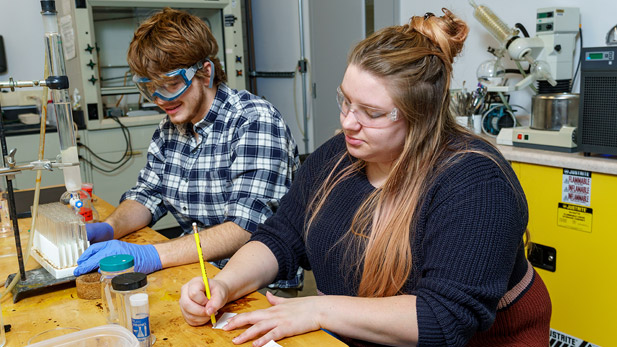Science Students Contributing to Cancer Research

Junior biochemistry students Jon-Michael Beasley and Elizabeth Klaas are in the first year of working to design, make and test new compounds that could potentially be used for the treatment of breast cancer tumor cells.
There’s a reason behind every student’s motivation to conduct research in the life sciences. Why else would anyone put themselves through the long hours in the laboratory, the painstaking documentation process, and the lengthy list of trials and errors at each stage of the discovery process?
Family matters and a desire to learn state-of-the-art research practices in chemistry have four biochemistry and chemistry students searching to find new compounds that could potentially be used for the treatment of breast cancer tumor cells that have become resistant to tamoxifen, a commonly used breast cancer drug.
The students are working under the guidance of chemistry and biochemistry professor Ross Weatherman to design, make and test new chemical compounds with the goal of dissecting how tamoxifen derivatives overcome a tumor cell’s tamoxifen-resistance mechanisms.
These compounds are designed to attack a target in breast cancer cells known as the estrogen receptor. The estrogen receptor is required for certain types of breast cancer to grow and is the primary target of the tamoxifen drug. One of the limitations of tamoxifen use is the development of tamoxifen-resistant tumors.
Over the past decade, Weatherman’s research students have discovered new derivatives of tamoxifen that can inhibit the growth of breast cancer cells, even those that are tamoxifen-resistant. The results of the current lab studies will be used to guide the design of future compounds with sufficient potency for potential clinical use.
Weatherman says, “These students are responsible for all components of the drug discovery and testing process, from the initial design and synthesis of the compounds to the study of their effects on breast cancer cells. Most students have trained in the lab for at least two years and all of them have gone onto careers in biomedicine, either through graduate study, medical school or jobs in the pharmaceutical and biotech industry.”
Seniors Hannah Rowe and Xinyi Li are in the second and final year of working to create a new tamoxifen derivative that will bind and, hopefully, better attack cancer cells. Aspects of their research are being picked up and expanded by juniors Jon-Michael Beasley and Elizabeth Klaas for future discoveries.
“We’re making slow steps, but have found some success around every corner in our research mission,” says Rowe, a biochemistry major whose family members have battled forms of cancer. “It’s exciting to come to the lab with no knowledge about what exciting things you’re going to learn. You also know that what you’re doing could benefit others.”
These research efforts have opened further opportunities in graduate school or doctorate degree programs for both seniors. Li, a chemistry and chemical engineering student, already has been accepted to two graduate school programs; Rowe has drawn interest from doctoral programs in pharmacology or cell biology after having two lucrative summer internships, one with Cook Medical.
“This research provided an excellent opportunity to practice all of the technical skills that I will need for graduate school,” Li says.
Beasley and Klaas also have graduate school aspirations.
“My original plan was to go into cancer research as a career,” Klaas says. “Getting to work with Dr. Weatherman and do this project has shown me a little bit of what that dream would actually be like. Even though Dr. Weatherman is guiding and helping me, I am in charge of my own project. That’s exciting. I have been able to take what I have learned in organic chemistry and apply it to my project. I also was able to take the research and knowledge on my project and use it in other classes, like biochemistry.”
Beasley agrees, stating “This research project, making compounds and testing them, is exactly what I wanted to do with chemistry. It has been a perfect fit for me.”
Weatherman was an American Cancer Society Postdoctoral Fellow and the value of his research has been recognized with grants totaling $2 million from the National Institutes of Health and the U.S. Army. He earned the Rose-Hulman Board of Trustees’ Outstanding Scholar Award in 2016 after developing strong collaborations with the Indiana University School of Medicine, and has authored more than 20 peer-reviewed research publications.
The professor cites that all of the chemistry and biochemistry graduates from his research projects have gone on to careers in biomedicine, either through graduate study, medical school or jobs in the pharmaceutical and biotech industries.
“Watching these students develop into professional life scientists is one of the highlights of my job,” he says. “Being able to closely help a student turn a general wish to help people into an actual professional plan is really rewarding.”